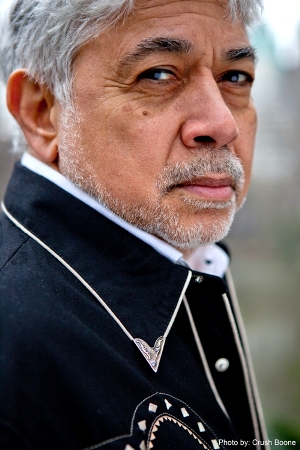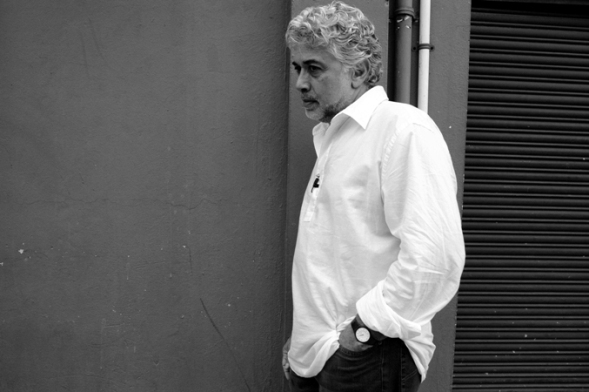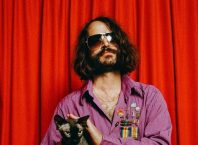“You hear those beats and those rhythms from Jamaica – you’d better start moving to that rhythm ! You gonna move unless you’re dead,” said Monty Alexander. The Jamaican born jazz pianist has recorded 70 albums, performed and recorded with a dream-list of performing artists that includes Frank Sinatra, Tony Bennett, Dizzie Gillespie, Bobby McFerrin and many, many more. Just back from a gig in Martinique and getting ready to set out to Washington DC, he took a quick break from his whirlwind schedule to chat with me in anticipation of his first performance in Israel at the New Israeli Opera on January 17, 2014.

“I love to play for audiences that don’t think the word: j-a-z-z. It’s music,” said Alexander, his voice resonant with the energy and warmth that can be heard in his music, “the thing with people like me, when you have a repertoire of – I’m being absurd when I say this – 5 billion and four songs, so many songs and tunes… you’re talking to how you feel and you reflect a little on the past, but you say now is now and the main thing is that the music must come alive and played with joy.”
Known for his ability to move between a variety of styles, merging jazz, pop and Jamaican music, Monty Alexander told me he will be performing in Israel with his trio – Obed Calvaire “a wonderful drummer, a younger guy of Haitian heritage with an Old Testament name, he’s swinging, but he’s playing rhythms” and “an incredible bass player from Chicago Lorin Cohen, he’s a master bassist but he is a strong foundation laid-down rhythmic wise bass player.” When asked what he has planned, he said the program will include: “My own compositions, also something from the classic tradition, also stuff that comes from my heritage as a Jamaican, rhythm from Jamaica and also that thing we call “in the moment”…improvisation – absolutely, but with a certain amount of order. We’re gonna burn it.”
Monty Alexander’s adventures with music begin in Jamaica, then move into jazz mode for a few decades and many albums before Jamaica entered more explicitly into his music. He’s recorded a couple of albums with jazz arrangements to Bob Marley’s songs, and one of his latest albums Harlem-Kingston Express, brings it all together: Sweet Georgia Brown meets No Woman No Cry meets Day-O (Banana Boat Song). There is a wonderful sense of play in his music, the kind of freedom that let’s his fingers dance into a touch of Bizet’s Carmen several minutes into Bob Marley’s Running Away.
Listening to Monty Alexander play piano, there seems to be magic in his fingers, and hearing the story of his musical beginnings, there seems to be magic at work there as well. How did a teenager from Jamaica come to be discovered by Frank Sinatra while playing piano at a club in Miami Beach? Monty Alexander shared with me the story of his musical beginnings:
“I happened to be fortunate that my folks had a piano in the house, an old upright grand piano. My mother played, and she sang in the choir. So this piano was sitting there and maybe I was three or four years old and I would just gravitate towards this wonderful looking piece of furniture and start to make noises with the piano. From an early age the piano was me, the piano was this friend of mine, it’s an extension.”
“And so there was a combination of just fascination with these black and white keys that make different sounds. It was my own thing I could play something that was gentle and kind or something that was aggressive when I wanted to annoy my parents. My mother said that she heard me picking out melodies from a very early age. She said how can you do that? I didn’t know that I could do that so I was always loving music… I’d have a rubber band and I’d start plucking on the rubber band like picking on a guitar. I was always beating on the table with the rhythms and you know they love their music Jamaicans, people like to dance and sing and that sort of thing and they had their share of American recordings: popular songs, easy listening and a little jazz.”
“Bing Crosby was a regular, then another staple became Nat King Cole. I heard these melodies and songs and I started to pick out the tune by ear, so they said you have to go to piano lessons. And then that’s something I hated to do, because somebody is sitting there telling me this that and the other and I’m kind of stubborn as a kid. So I went and took piano lessons for maybe a couple of years. It wasn’t like going to conservatory or music school, but I was sort of rebellious from the beginning. I already found my way around what we used to call Boogie Woogie, so I’m hearing that, I’m playing that, and next thing you know I’m entertaining the neighbors when they come over: Monty, go play the piano!”
“So I’m already being called the entertainer but also I love music, I love the piano you can get the piano to sound a certain way and express, so I’m just loving music. I never knew what jazz was, but from the very beginning I’m making up stuff as we call it just creating so that was my beginning, but I’m also hearing popular songs which is the substance of a lot of what jazz musicians were doing – taking popular songs and doing their own improvisations. So I’m getting a wonderful education, just loving the whole ball of wax as we like to say.”
“And in Jamaica we have this thing called folk music, Mento, known around the world as Calypso which the great Mr. Harry Belafonte took to another level and the world fell in love with the islands and Jamaica and Calypso, and this is long before Reggae and Ska and I’ve learned all those songs. I heard Louis Armstrong, they had a couple of records. Now when you combine that with me going from place to place hearing the local musicians now I had an accordion and they guys would welcome me come on Monty let’s hear you play and I’d be right in there with them, whatever song it was I’d play it on my accordion. I used to sneak out of school to do this thing my teacher would have slapped me for, I used to go to the recording studios while I should have been at class studying and that’s when I started playing for artists, forerunners of Bob Marley, rhythm on the piano so I’m in there with all the best Jamaican musicians.”

“Now put it all together – there’s absolutely no structure no program of studying it’s just me going from place to place with my accordion or I had a little guitar, sitting in with guys who wanted to be jazz people. So you put it all together, here’s a guy who’s learning these songs, and It’s all because of my ear and by the way – to this day I haven’t worked at reading notes on a piece of paper. Then of course I did have access of hearing and trying to play the music of some of the great masters so I knew what a Bach fugue was. I loved Bach and heard Franz Liszt and I would try to play that, but I would gravitate to my own little songs and such.”
“In Jamaica we had a rich program of artists coming from outside of Jamaica, this is in the 50s. A lot of rhythm and blues people came I saw Brook Benton, Jackie Wilson, Sam Cooke. I saw these people, I saw what happens when they go on a stage and how people would be uplifted. And the king of them all was Satchmo and I saw him in the movies so he became my ultimate hero. My Dad gave me a trumpet, I was trying to be Louis Armstrong. I was maybe ten twelve years old and then Louis Armstrong came to Jamaica and also my other hero Nat King Cole. I knew all those songs but I didn’t know he played piano the way he did… he was a very great, great, great, piano player.”
“So you got my pop repertoire, my Jamaican repertoire, my rhythm and blues repertoire, my local Jamaican thing, songs by Bing Crosby – this is one big beautiful world and I’m playing piano while this is happening so my influences are just coming from all sides.”
“That’s why I never knew what jazz was, because I’m speaking of everything. And then one day I heard a record by a jazz artist, maybe it was organ player Jimmie Smith, and it was connected to that R & B thing, and I just felt: this is something else. And I started to try and play those notes.”
“And then one day I’m offered a job. I’m gonna get paid. I go home and I said: Mom look, I got this money here. She looked at me said: Where did you get that? I said I’m playing the piano and they’re paying me and they want me to come back and play again. Sounds like a Hollywood film, right? So this is from when I was about 14 or 15, I formed a school band and played popular songs.”
“Then Mom said we’re going to America. She had divorced with my father and said we’re going to Miami, she had friends there. At 17 I started hanging out in Miami Beach going from club to club and sitting in on piano because they would welcome me. Musicians tend to be a very friendly bunch of people except for your occasional hung up person who doesn’t want to be friendly. One day an agent said: I can get you work kid. So next thing I know I’m playing in a club in Miami, Florida.”
“One day after a year or so, I’m playing and a party of people came in the club and it included Frank Sinatra, Sinatra saw me playing with his friends and that’s how I got to New York. They hired me and I came and I started playing and I knew loads of songs. Apparently, I was already swinging, as they say.”
“I always kept my connection with things Jamaican, just social connections, friends from school, and what the latest thing was that was happening. When I was playing in some club somewhere with a bass player and a drummer and I would try to show them: I want to play a song from Jamaica. And I’d play that stuff – those guys as great as they were, they just didn’t get the hang of the simplicity of it all, just such a simple approach to these songs, and I never could get that good feeling that they knew what the thing was. Of course it was, what’s the word? An ethnic thing. It’s part of your heritage, so you have to know what that’s about. So I never was satisfied playing with Americans.”
“Several years later while I’m thick into the jazz world, I played with Dizzie Gillespie, Milt Jackson, Ray Brown, I accompanied Sinatra. I was invited to accompany Ella Fitzgerald but because I didn’t read, I declined it. I was afraid I was gonna really mess up if I went with Ella. I think I was getting kind of disenchanted, because my friends, this is like 30 years on, my friends were passing on, getting older and this is a whole crop of new young people, and I hadn’t allowed myself to get familiar with the young crowd and I ‘m feeling like: what’s happened? where’s everybody going? Of course, some of them were dying.”
“And I was in Jamaica just visiting with musicians like I always do and somehow the desire came to me to do things with Jamaicans, who, when they play this is what they do, which is what I also can do. And I did a little this and a little that and I’m loving it and I say – let me bring what I have acquired from my adventures in the so-called world of jazz into that and back and forth. And out of that came this new direction, which didn’t forget about what you do when you sit at the piano with great jazz men. I was bringing my home culture into what I was doing and having such a wonderful time and I’m still doing it. Somewhat.”
“I’m just taking that music which is in my soul and putting another layer on it. I put harmonies that still are connected to the song, with the harmonies that I love, I put in a little different color on the whole thing but never to sacrifice one iota of the essence which is the rhythm: we’re not going to let that go.”
As our conversation came to its close, I asked Monty Alexander if of all his many songs there was one that had a special meaning for him, he said, “I wrote a song some years ago, inspired by the belief that every moment can be a new moment, the song is called Renewal. That’s been pretty much a mainstay of the repertoire, it’s always renewed when I play it.”
Then, looking back on the conversation he added, “You know it’s funny, I’m talking to you and you have such beautiful diction that I’m doing my best to use beautiful diction and you know I realize: wait a minute! I sound like a proper speaking American, but the real truth is me a Jamaican boy. You know me I say? When I warm up and loosen up I talk like a boy from Jamaica. I live in two different worlds, but one love.”
The Monty Alexander Trio will perform at The New Israeli Opera, 19 Shaul HaMelech Street, Tel Aviv, on January 17, 2014 at 22:00. Tickets are 115 – 199 NIS, and may be ordered online or call: 03 – 6927777.





